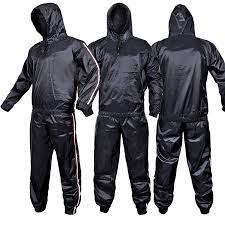Fitness enthusiasts wear sauna suits to help burn more calories and get deeper conditioning while working out. The three types of material frequently used in the construction of sauna suits are PVC, nylon, and neoprene. While all of these fabric types help athletes sweat and lose more weight while working out, each one offers different benefits and drawbacks. If you’re buying your first sauna suit, this information can help you determine which material makes the most logical choice for your needs.
- PVC
PVC is a synthetic plastic material. If you’re not sure about using a sauna suit and want to try one out, PVC may be a good option to test them out because these are the cheapest versions. However, the PVC fabric tends to tear easier and be less durable than sauna suits made from other materials. It may not be as comfortable as the other fabrics, since the plastic in PVC traps body heat inside and doesn’t allow the body temperature to regulate as well as nylon or neoprene suits. The least expensive sauna suits are made of PVC fabric and generally range from $10 to $30 in price.
- Nylon or Nylon/PVC
Image via Flickr by Aarni Heiskanen
Many sauna suits are made of a combination of nylon and PVC. Nylon is more durable than PVC, but it can still hold in body heat without allowing enough cooling for the body. Perhaps the biggest drawback to nylon material is that it isn’t stretchy and doesn’t have a lot of give, so when exercising it can feel somewhat restrictive. Nylon or nylon/PVC suits usually cost between $30 and $60.
- Neoprene
Neoprene is considered to be the best material for sauna suits because it’s more comfortable than PVC or nylon fabrics and its flexibility allows a full range of motion. Neoprene is also much more durable than the other materials and isn’t likely to tear or wear out. When cleaned properly, neoprene sauna suits last significantly longer than the other fabrics.
The best part of a neoprene sauna suit is that it wicks sweat away from the body and reduces sweat odor. It also allows the body to cool off as you sweat and reduces the risk of overheating while exercising because neoprene suits usually have ventilated areas throughout the suit. Quality neoprene sauna suites usually cost from $60 to $110.
Be aware that some people have an allergic reaction to neoprene, so try to test the fabric for skin irritation before purchasing a neoprene suit. Don’t exercise for longer than 60 minutes when wearing a sauna suit, and remember to hydrate throughout your workout.
When you’re ready to try out a sauna suit, do your research to find the suit that best meets your fitness needs. Make sure the suit you purchase is made of quality materials, and check the description to find out of the sauna suit is constructed with ventilation areas. When purchasing sauna suits, the best investment is buying a high-quality suit sold by a reputable company.
